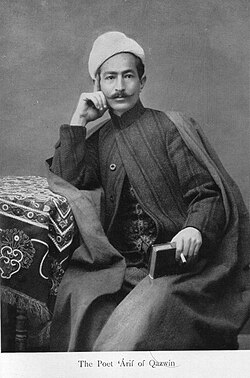Aref Qazvini
Iranian poet, lyricist, and musician From Wikipedia, the free encyclopedia
Abolqassem Aref Qazvini or َAref Qazvini (1882 – January 21, 1934; Persian: ابوالقاسم عارف قزوینی), also known as National Poet (Persian: شاعر ملی) was a distinguished Iranian poet, lyricist, and musician. Known for his significant contributions to Persian literature and music, Aref Qazvini's work continues to influence and inspire. His artistic legacy encompasses both his poignant poetry and his lyrical compositions, reflecting the cultural and social nuances of his time.
Biography
Summarize
Perspective
Aref Qazvini was a renowned Iranian poet, lyricist, and musician. Born in Qazvin, he became celebrated for his deeply patriotic and revolutionary poetry, earning the title of a national poet. His works were a significant part of the Iranian Constitutional Revolution, where his political and pro-revolutionary songs rallied many to the cause.
Aref Qazvini's contributions extended beyond poetry to include lyrics for numerous songs, showcasing his musical talents. His compositions often reflected his revolutionary spirit and love for Iran. In his later years, he moved to Hamadan, where he died in January 1934 at the age of 52.
Posthumously, his complete works were published in Berlin and Tehran. One of his notable poems, The Imprisoned Bird's Moaning (Persian: ناله مرغ اسیر), is a call to his compatriots to fight for their freedom. In the poem's first six verses, Aref urges the people to reject foreign assistance and sacrifice their lives for their nation's sovereignty. He criticises the Shah, portraying him as an enemy of the people, reflecting the poet's patriotic sentiments and anti-colonial attitudes prevalent during the Constitutional period.
The poem uses powerful imagery to convey its message. Birds symbolize freedom, with the caged bird representing oppressed individuals unable to express themselves. This metaphor serves to warn the countrymen against silence and passivity, likening it to the despair of caged birds. Another symbol, the wind, represents liberty in Persian literature, signifying hope and the widespread call for freedom. The wind's universal reach underscores the necessity for all Iranians to unite in saving their country.
Aref Qazvini's poetry often questioned the bourgeoisie system, challenging the ruling class's ideology. By addressing his fellow countrymen, he aimed to empower them to resist authority and fight for a free and independent Iran. His work remains a testament to his enduring impact on Persian literature and the revolutionary spirit of his time.
External links
Wikimedia Commons has media related to Aref Qazvini.
- J. Matīnī, M. Caton, ʿĀref Qazvīnī / Encyclopædia Iranica (1986—2011).
- Abolqassem Aref Ghazvini Archived 2021-06-24 at the Wayback Machine, Rouhollah Khaleghi Artistic Center / Kanun-e Honari-e Rouhollah Khaleghi Archived 2021-01-25 at the Wayback Machine
Wikiwand - on
Seamless Wikipedia browsing. On steroids.

